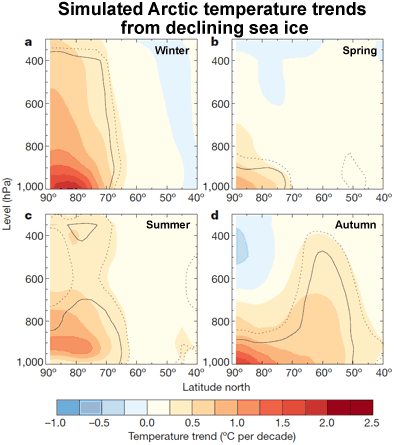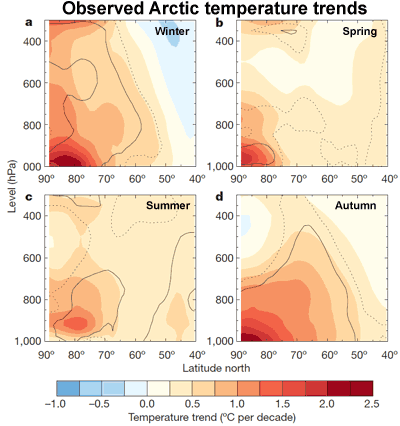 Arguments
Arguments
 Software
Software
 Resources
Comments
Resources
Comments
 The Consensus Project
The Consensus Project
 Translations
Translations
 About
Support
About
Support


Latest Posts
- 2025 SkS Weekly Climate Change & Global Warming News Roundup #15
- Skeptical Science New Research for Week #15 2025
- Renewables allow us to pay less, not twice
- Sabin 33 #23 - How much land is used for wind turbines?
- Our MOOC Denial101x has run its course
- 2025 SkS Weekly Climate Change & Global Warming News Roundup #14
- Fact brief - Is Mars warming?
- Skeptical Science New Research for Week #14 2025
- Two-part webinar about the scientific consensus on human-caused global warming
- Sabin 33 #22 - How does waste from wind turbines compare to waste from fossil fuel use?
- Clean energy generates major economic benefits, especially in red states
- 2025 SkS Weekly Climate Change & Global Warming News Roundup #13
- Skeptical Science New Research for Week #13 2025
- Climate skeptics have new favorite graph; it shows the opposite of what they claim
- Sabin 33 #21 - How does production of wind turbine components compare with burning fossil fuels?
- China will need 10,000GW of wind and solar by 2060
- 2025 SkS Weekly Climate Change & Global Warming News Roundup #12
- Skeptical Science New Research for Week #12 2025
- Climate Fresk - a neat way to make the complexity of climate change less puzzling
- Sabin 33 #20 - Is offshore wind development harmful to whales and other marine life?
- Do Americans really want urban sprawl?
- 2025 SkS Weekly Climate Change & Global Warming News Roundup #11
- Fact brief - Is waste heat from industrial activity the reason the planet is warming?
- Skeptical Science New Research for Week #11 2025
- Visualizing daily global temperatures
- Sabin 33 #19 - Are wind turbines a major threat to wildlife?
- The National Hurricane Center set an all-time record for forecast accuracy in 2024
- 2025 SkS Weekly Climate Change & Global Warming News Roundup #10
- Fact brief - Is Greenland losing land ice?
- The Cranky Uncle game can now be played in 16 languages!
Archived Rebuttal
This is the archived Intermediate rebuttal to the climate myth "Melting ice isn't warming the Arctic". Click here to view the latest rebuttal.
What the science says...
| Decline in sea ice is the major driver of Arctic amplification. This is evidence by the pattern of atmospheric warming over the Arctic. Maximum warming occurs over the surface during winter while less surface warming is found in summer when heat is b |
The warming trend in the Arctic is almost twice as large as the global average in recent decades. This is known as Arctic amplification. What's the cause? Changes in cloud cover, increases in atmospheric water vapour, more atmospheric heat transport from lower latitudes and declining sea ice have all been suggested as contributing factors. A new paper The central role of diminishing sea ice in recent Arctic temperature amplification (Screen & Simmonds 2010) (here's the full paper) examines this question. The title is a bit of a give-away - the decline in sea ice is the major driver of Arctic amplification.
The vertical profile of Arctic warming (eg - how much warming occurs at different altitudes) gives us insight into the underlying cause. If atmospheric heat transported from lower latitudes was the major driver, more warming would be expected at greater heights. On the other hand, if retreating snow and sea ice cover was the major cause, maximum warming would be expected at the surface. Figure 1 shows the simulated warming expected in each season if declining sea ice was the major cause of warming.

Figure 1: Temperature trends linked to changes in sea ice. Temperature trends over the 1989–2008 period averaged around circles of latitude for winter (a), spring (b), summer (c) and autumn (d). The trends are derived from projections of the temperature field on the sea ice time series.
Using higher resolution temperature data supplemented with updated satellite measurements, Screen 2010 analyse the observe warming trend in each season. What they find is maximum Arctic warming at the surface and that warming lessens with height in all seasons except summer. This vertical structure suggests that changes at the surface, such as decreases in sea ice and snow cover, are the primary causes of recent Arctic amplification.

Figure 2: Observation of temperature trends, 1989–2008. Temperature trends averaged around circles of latitude for winter (December–February; a), spring (March–May; b), summer (June–August; c) and autumn (September–November; d). Red shading indicates that the lower atmosphere has warmed faster than the atmospheric column as whole. Blue shading indicates that the lower atmosphere has warmed slower than the atmospheric column as a whole.
The surface warming is modest in summer because energy is used to melt remaining sea ice and warm the upper ocean. The majority of the winter warming is associated with changes in sea ice cover even though the sea ice declines at this time of the year are relatively small. During summer, the atmosphere loses heat to the ocean whereas during winter, the flux of heat is reversed. Reduced summer sea ice cover allows for greater warming of the upper ocean but atmospheric warming is modest. The excess heat stored in the upper ocean is subsequently released to the atmosphere during winter.
Another potential contributor to amplified warming that's investigated is changes in cloud cover. Spring is the only season that exhibits significant trends in Arctic average cloudiness and the trend is negative. However, decreased cloud cover is expected to cause surface cooling because clouds have a warming influence in spring. Thus no evidence is found of cloud cover changes contributing to recent near-surface Arctic warming.
Changes in atmospheric water vapour content may amplify Arctic warming. However, specific humidity trends are found only during summer and early autumn. The pronounced warming in winter and spring are not accompanied by increases in humidity. In fact, the evidence suggests part of the humidity increase is driven by enhanced surface moisture fluxes associated with sea ice reductions.
The empirical evidence from the past two decades reveals that declining sea ice cover and thickness have been great enough to enhance Arctic warming during most of the year. The emergence of strong ice–temperature positive feedbacks increases the likelihood of future rapid Arctic warming and sea ice decline.
Updated on 2010-06-26 by James Wight.
THE ESCALATOR

(free to republish)
























































